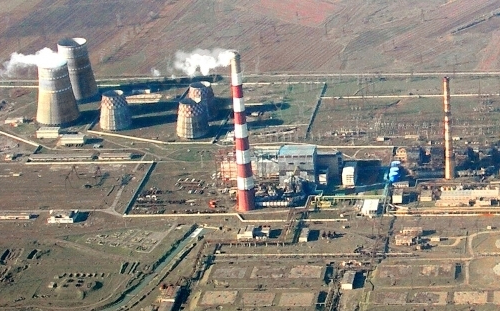
Regulator OKs Gas-Fired Power Tariff Increase, But Short of Hike Sought by Companies

Thermal power plant in Gardabani owned by Russia’s state-controlled power trader Inter RAO, which holds 75.1% of shares in Telasi, an electricity distributor company in Tbilisi. Photo from Mtkvari Energy website
The Energy and Water Supply Regulatory Commission has approved to increase tariff on electricity generated by gas-fired power plants, operated by three companies two of which are also largest electricity distributors in Georgia.
But the new tariff, set by the regulator on July 22, is far short of increase requested by the companies, which seek higher fees to offset their surging expenses on purchasing of natural gas caused by depreciation of the Georgian currency lari.
Thermal power accounted for up to 19% of total electricity generation in Georgia in 2014.
The three companies, which have asked the regulator earlier this year for the increase of tariff for which they sell generated electricity to distributor companies, are: gPower, Mtkvari Energy and Georgian International Energy Corporation (GIEC).
gPower is a subsidiary of Energo-Pro Georgia, the largest electricity distributor in the country with 63% of market share. gPower operates 110-megawatt gas turbine power station located in Gardabani. Energo-Pro Georgia, which is part of the private Czech group Energo-Pro, also operates twelve hydro power plants in Georgia and distributes electricity to over a million customers outside Tbilisi.
Mtkvari Energy is owned by the Russia’s state-controlled power trader Inter RAO, which holds 75.1% of shares in Telasi, an electricity distributor company in Tbilisi. Telasi is the second largest distributor of electricity in Georgia with 32.5% market share. Mtkvari Energy operates thermal power plant with the installed capacity of 300-megawatt, which is also located in Gardabani.
Georgian International Energy Corporation (GIEC) is a daughter company of one of the country’s largest industrial holdings, Georgian Industrial Group (GIG); it operates thermal power plant located also in Gardabani.
All three buy gas to operate their thermal power plants from the Azerbaijani state-owned SOCAR for USD 143 per 1,000 cubic meters, according to filings submitted by the companies to the regulator agency.
The regulator authorized gPower to increase its tariff only by 1.8% to 7.534 tetri (without VAT) for one kwh of electricity.
Mtkvari Energy was requesting increase of its tariff from current 7.17 to 12.75 tetri for one kWh, but the regulator approved tariff raise to only 10.871 tetri.
GIEC wanted its tariff to be increased from current 7.319 to 13.98 tetri, but the regulator ruled to increase it up to 10.194 tetri for one kWh.
Zurab Gelenidze, chief financial officer of GIG, a parent company of GIEC, said that “the sustainability of the entire system will become questionable” as a result of regulator agency’s refusal to approve tariff hike at the level requested by the companies; he added that it would also discourage further investments in the electricity generation sector.
Mikheil Botsvadze, a senior executive of Energo-Pro Georgia, said during regulator’s session that without increase of tariffs distributor company will no longer be able to secure round-the-clock supply of electricity in November-December.
Deputy Energy Minister, Mariam Valishvili, dismissed such concerns.
She told the Georgian public broadcaster: “I do not think that the tariff set [by the regulator] is either low or high – that’s exactly what it should be defined by a relevant methodology. Therefore this is the price, which guarantees that there will be no problems with electricity supply.”
Regulator’s July 22 session was also attended by representatives of several small non-parliamentary opposition parties, who slammed the decision to increase tariffs and called for “disbanding” of the regulator.
On July 23 the Energy and Water Supply Regulatory Commission is expected to rule on a separate request by the Energo-Pro Georgia, which seeks increase of electricity tariff to its consumers, citing depreciation of lari.
Electricity tariffs for some category of households were reduced in 2013, which was one of the pre-election campaign promises of the Georgian Dream coalition.
When signs of possible electricity tariff hike first emerged several months ago amid depreciation of lari, Energy Minister Kakha Kaladze said in May that the government will consider “targeted subsidizing” if electricity bills go up.
In May the Energy and Water Supply Regulatory Commission rejected a request by the water supply company in Tbilisi to increase the tariff.
This post is also available in: ქართული